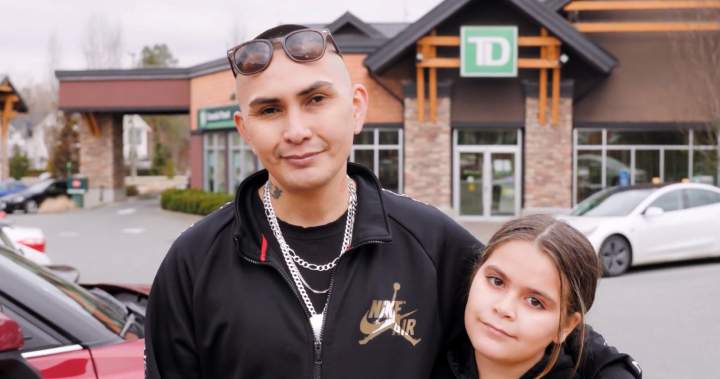A human rights complaint has been settled between the TD Bank and a Muslim-Indigenous man who claimed he was racially profiled while trying to open a bank account at a Surrey, B.C., branch.
Sharif Mohammed Bhamji, a member of the Heiltsuk Nation, said he hopes his case serves as example to others who have experienced similar injustices and encourages them to speak out.
“It’s not the solution but it’s definitely part of it, and I’m glad to be part of a solution,” he said in an interview.
Bhamji and TD executives took part in a traditional Heiltsuk washing ceremony on Sunday in Bella Bella, a healing ritual that the nation’s elected chief said sets the bar for corporate accountability.
The monetary values of the settlement have not been made public, said the Heiltsuk First Nation, who joined Bhamji in the filing of the 2022 Canadian Human Rights Commission complaint.
But the nation said in a news release that it included general damages, funds for its Urban Heiltsuk Support Team in Vancouver and funding to cover the costs of the washing ceremony.
It said TD Bank has also improved its training and process around the use of status cards “to the satisfaction of all involved.”
The settlement marks the conclusion of a complaint that was set off in May 2021 when Bhamji went into a TD branch near his Surrey home to verify his identity after completing the online portion of the banking application.

Get breaking National news
For news impacting Canada and around the world, sign up for breaking news alerts delivered directly to you when they happen.
When he presented his Indian status card, the teller, seemingly perplexed by his Muslim last name, told him it was fake, Bhamji said on Sunday.
Bhamji’s father is Muslim from India while his mother is a member of the Heiltsuk First Nation on B.C.’s northwest coast.
“I ended up leaving frustrated,” he said.
He thought that was the end of it, saying it is not unusual for him to experience racial profiling.
“I totally thought that our business was ended and I would have to find somewhere else to go, and that was the end of it,” he said.
But he was surprised when police showed up at his house, inquiring about the situation and asking about his name and status.
“They realized nothing was fraudulent and no charges were laid, but that situation led us to where we are today,” he said of the human rights complaint.
“I felt like I needed to do something, just because it just felt so wrong. The situation felt so wrong.”
TD spokesman Mick Ramos said in an emailed statement that the bank is striving “to do better and have since taken steps to learn from” the situation and ensure “it doesn’t happen again.”
“We recognize that unconscious bias can lead to discrimination and wholeheartedly apologize to Mr. Bhamji for his experience,” Ramos said in the statement.
“We also extend this apology to Mr. Bhamji’s family, the Heiltsuk Nation and its community members.”
Bhamji and members of TD’s executive took part in a traditional washing ceremony, which elected Heiltsuk Nation Chief Marilyn Slett said is one of the most significant strides coming out of the human rights process.
She said the bank’s participation in the healing ceremony sets “a precedent for corporate accountability in Canada.”
“That really aids in the healing of traumatic instances like what happened to Sharif,” she said in an interview.
The situation is not isolated, Slett said, pointing to another human rights complaint brought by the Heiltsuk Nation against BMO.
Maxwell Johnson, who alongside Heiltsuk Tribal Council, settled with BMO after he and his 12-year-old granddaughter were handcuffed in 2019 after trying to open a bank account.
Johnson and the Nation also settled with the Vancouver Police Department, but Slett said the arresting officers backed out of a scheduled washing ceremony, “preventing healing and closure from the incident.”
The Vancouver Police Department did not immediately respond to requests for comment.
Slett said both scenarios go a long way in bringing awareness to racial injustices.
Cases like Johnson’s and Bhamji’s provide the opportunity for banks and other corporate structures to “take a look at their processes and their policies and make those changes so it doesn’t happen again,” she said.
Bhamji agreed, saying he hopes it signals a larger cultural shift, adding that he did took his business to another bank — where he intends to stay.
“I don’t have any negative feelings toward TD Bank,” he concluded. “I’m glad they worked with us and were able to find a solution with us.”
© 2025 The Canadian Press
https://globalnews.ca/news/11529171/sharif-mohammed-bhamji-td-bank/





